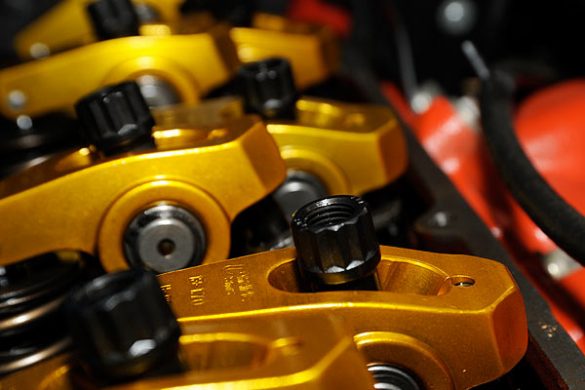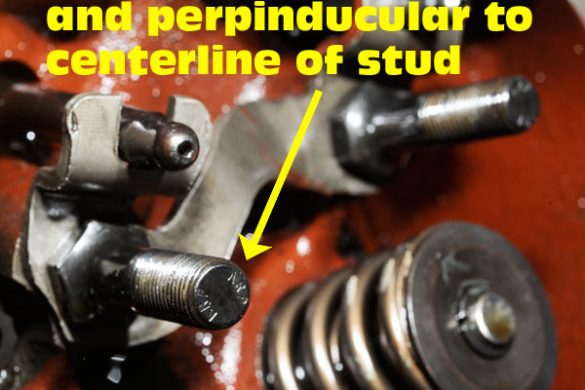Today, only two types of Corvette owners have cars with mechanical lifter camshafts: vintage Vette enthusiasts and hard core hot rodders. I’m in the latter group.
Ever since I bought my first Corvette as a teenager in, well…ok, it was a while ago – I’ve often owned Vette hot rods with mechanical lifter cams. Suffice to say, I’ve been lashing valves on Corvette engines virtually all of my automotive life – first a 327/340, then several 350s in a Corvette which ran in the SCCA’s old B/Production class and finally, the 460-inch Big Block in my 71 T-Top hot rod.
With my old 327, one of the first mods I made was to replace the stock rocker nuts with a set of “poly-locks” which were a two-piece, locking rocker arm nuts developed by the performance aftermarket in the 1960s. The center of the nut was threaded for an Allen screw. After the lash adjustment was made, you held the nut with a box wrench and tightened the Allen to lock the adjustment.
The poly lock didn’t really make “running” the valves any easier but it made the adjustment more secure than it could be with the stock “self-locking” nuts.
One problem with poly-locks is that most of them do not have the surface of the Allen screw that butts against the top of the rocker stud machine perfectly flat and most rocker studs are not machined flat across their tops. If the two surfaces are not flat and parallel, the poly-lock may actually not lock as securely as it could and the final adjustment – when the Allen screw is tightened – may actually change slightly causing you to redo the adjustment – sometimes several times until you get it right.
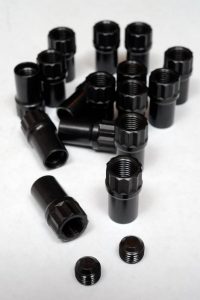 Automotive Racing Products, a Ventura, California company, makes the finest automotive fasteners in the world. ARP products are used world-wide in top racing series such as Formula 1, IZOD IndyCar, NASCAR Sprint Cup and ACO.
Automotive Racing Products, a Ventura, California company, makes the finest automotive fasteners in the world. ARP products are used world-wide in top racing series such as Formula 1, IZOD IndyCar, NASCAR Sprint Cup and ACO.
A number of years ago, ARP introduced a premium rocker arm stud for the Chevrolet V8s which has its top surface machined flat. More recently, they introduced a unique valve adjusting nut called a “Perma-Loc” which has the bottom side of its adjustment locking screw ground flat, just like the tops of ARP’s studs.
There are several reasons why Perma-Loc rocker arm adjusters are an improvement on other designs.
First, the adjuster body is not just case hardened, but heat-treated all the way through. This eliminates the flexing of the threads common to ordinary poly-locks. Secondly, the threads are machined exactly perpendicular to the bottom of the adjuster, so it seats evenly and applies pressure on a full 360 degree circle. Lastly, the set screw’s ground-flat bottom has optimum contact on the rocker arm stud. No other adjuster is manufactured more accurately and no other adjuster works as well with mechanical lifter camshafts – I know, I’ve tried several others.
A few months ago, I installed both ARP rocker studs (PN 235-7201) and Perma-Locs (PN300-8245) on the 460-inch BBC in my ’71 and as I installed the parts then adjusted each rocker, I noted the adjustment process was quicker. The Perma-Loc’s compact, 12-point head is designed to hold the wrench in position while I lock the set screw with an Allen wrench.
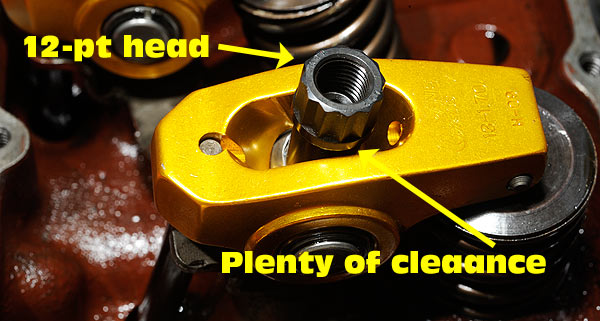 In the past, with an ordinary poly-lock, I almost never got the adjustment right the first time. After tightening the locking screw, I often had to perform the adjustment again – sometimes three times. With ARP studs and Perma-Locs, because their ends are ground flat, I only had to do it once per valve to get just the right adjustment. With the better rocker studs, I’ve got an increased margin of reliability/durability and with the Perma-Locs, maintenance is made easier.
In the past, with an ordinary poly-lock, I almost never got the adjustment right the first time. After tightening the locking screw, I often had to perform the adjustment again – sometimes three times. With ARP studs and Perma-Locs, because their ends are ground flat, I only had to do it once per valve to get just the right adjustment. With the better rocker studs, I’ve got an increased margin of reliability/durability and with the Perma-Locs, maintenance is made easier.
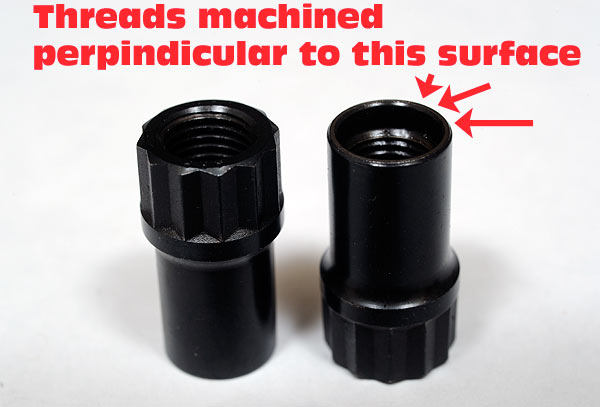 Perma-Locs are available in a standard length for tall valve covers and can be ordered in a special short version to fit under stock valve covers. For more information, see Automotive Racing Products’ web site at www.arp-bolts.com, email to info@arpfasteners.com or call ARP at 800.826.3045.
Perma-Locs are available in a standard length for tall valve covers and can be ordered in a special short version to fit under stock valve covers. For more information, see Automotive Racing Products’ web site at www.arp-bolts.com, email to info@arpfasteners.com or call ARP at 800.826.3045.


